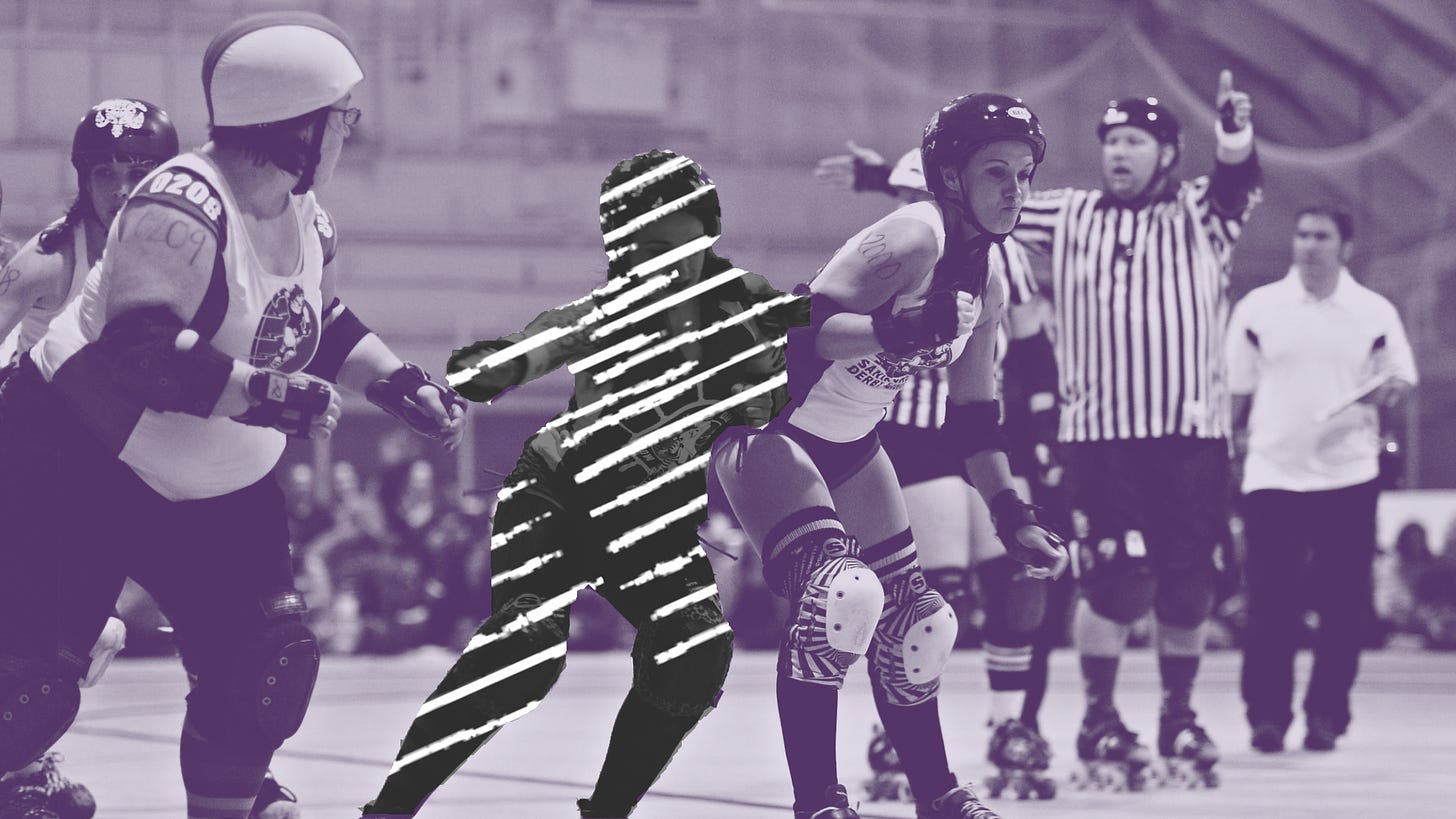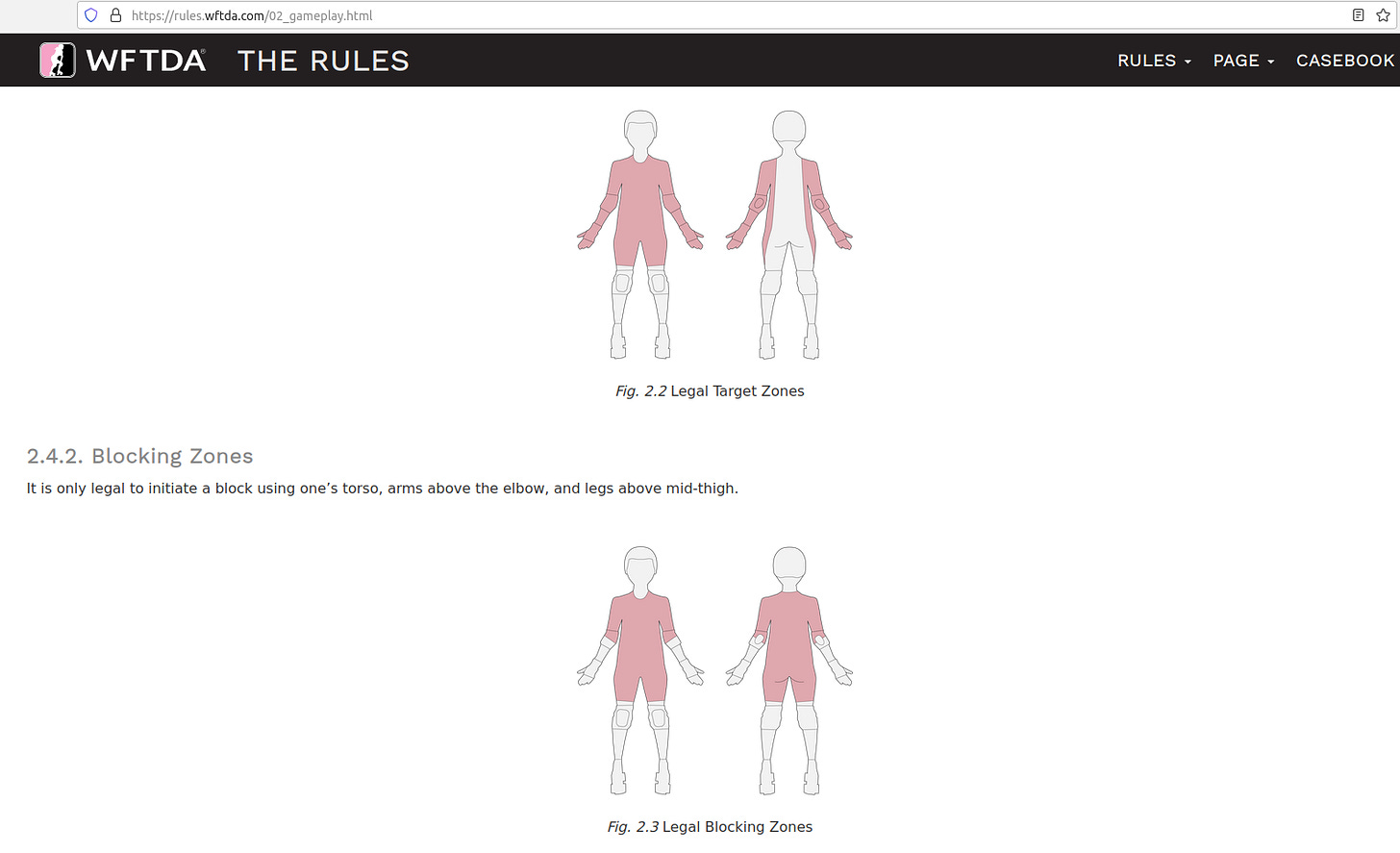In December 2021, controversy erupted over the American swimmer Lia Thomas, a trans-identified male, who smashed national USA women’s records in competitive college swimming. Like Olympic weightlifter Laurel Hubbard, cyclist Rachel McKinnon/Veronica Ivy and MMA fighter Fallon Fox before him, Lia’s sporting victories brought the conversation about the fairness of "trans inclusion" in women’s sport back into the spotlight.
Radical Feminists have been concerned for a while, but for anyone not well-versed in the debate, it feels like a new conversation. However, to those familiar with the niche—and explicitly feminist—sport of Roller Derby this is just so much déjà vu. We've seen it before, and we witnessed how trans activism destroyed a sport that was founded as a feminist, female-centered, and female-celebrating sport.
You may have heard of Roller Derby as a peculiar twentieth century spectacle, similar to wrestling. As well as choreographed bouts, stage identities and ridiculous costumes, it featured outlandish races where skaters had to leap over alligator pools and more.
In the early 2000s, in Texas, a group of feminists decided they wanted to create a new sport, one that was female-centered, feminist, and empowering. They dragged the skeleton of "old-school" roller derby out of its grave, and built a new, exciting and dangerous sport from the remains.
The Women’s Flat-track Derby Association (WFTDA) was founded in 2004. It wasn’t until 2007 that the Men’s Flat-track Derby Association (MRDA) was founded, using the rules created and set down by WFTDA, and only after seeking licensing permission from WFTDA. Originally, men weren’t involved with the running of women’s roller derby leagues, and they certainly weren’t allowed on track. Men could help by coaching, refereeing or officiating. But women were the head and heart of the sport.
The rules around men’s inclusion extended to trans-identified females, and non-binary skaters. If you were female but didn’t identify as a woman, you couldn’t skate on the track. They were a bit more flexible when it came to trans-identified males, but inclusion was based both on evidence of medical and social transition, and—crucially—was very much on a case-by-case basis. Every skater had a say in her league’s policy. If the majority of skaters in a league felt that someone didn’t belong on the track with them, no matter how he identified or how well he "passed" as a woman, he didn’t skate.
From the top of the slippery slope, this worked well. There were a few trans identified males in a small number of leagues, but they fitted in and didn’t excel on track. Nor did they dominate the sport (either in athletic prowess or in terms of leadership). Unless you were told who they were, you couldn’t tell from watching the game that they were male. It still felt like a women’s sport.
Growing pains
Roller Derby rapidly grew in popularity from 2004 to 2010. Because the governing body, WFTDA, proudly identified itself as feminist, many of the people joining Roller Derby had an activist mindset, but their activism was centered on gender identity and intersectional feminism.
The push back against centering women in Roller Derby initially came from women who identified as non-binary. Roller Derby was always a very welcoming space for lesbian and bisexual women, many of whom aren’t especially gender conforming. So it’s probably no surprise that as the concept of being "gender non-binary" became more popular, it ripped through Roller Derby like an STI.
The numbers of women identifying as non-binary outnumbered the small number of trans-identified males in Roller Derby. And thus (certainly at first) it was “non-binary” women who pushed hardest for changes to the WFTDA gender inclusion policies. Meanwhile, trans-identified males gained validation from being accepted in a "women’s sport." So WFTDA was flanked from two sides in the gender ideology wars.
When the rules for Women’s Flat-track Roller Derby were formalized, they used female pronouns to refer to all skaters on the track. The rulebook archives on WFTDA’s website, whose earliest edition is from 2006, is still in keeping with the fact that WFTDA was a proud women’s sport. In the 2006 edition of the rules, the word "she" is used 26 times, and the word "her" appears 33 times in a 9 page booklet. In the 68 page, June 2013 edition of the rulebook, the words "she" and "her" do not appear. The gender neutral pronoun "they" appears 69 times. This still stands in the most recent version of the rules, from 2019.
As more noise was made about being inclusive of "gender diversity," WFTDA eventually released a new statement and official set of policies and by-laws around gender, in November 2015. Many trans identified skaters felt empowered to push for bigger changes around inclusion, and this was supported by the governing body of the sport:
"It's much more inclusive, with a self-identifying approach… If women's flat track derby is where you see yourself, whether or not you identify as a woman or use women's pronouns, we're making sure there is something here for you."
Pushing at an open door
By the world championships in November 2017, the major leagues loudly welcomed both non-binary and trans identified male skaters onto their rosters. The semi-final was played out between Gotham Girls Roller Derby (of New York City) and Portland, Oregon’s home team, Rose City Rollers.
On Gotham’s roster was the well-recognized "triple threat," Vanessa V-Diva Sites. For the first few years of his stratospheric skating career he didn’t openly acknowledge that he was transsexual. When he came out, he was applauded for his bravery and women who’d skated against him were told in no uncertain terms that his domination on the track was down to his skill, not his biological sex. To anyone who’d seen V-Diva skate, the announcement that he is male was hardly a surprise.
Likewise, on Rose City Rollers were two notable skaters: Simonis (who now skates as Ms Dr Joseph L Simonis) and Beyond Thunderdame. They are both trans identified males. In the semi-finals of the 2017 World Championships, the team with two trans identified males beat the team with one.
A few women voiced their concerns that the sport was changing, and that male skaters were both taking women’s places on teams - and dominating the bouts. The backlash was swift and uncompromising. WFTDA released a public statement (written by a trans-identified male) declaring that the organisation “stands in solidarity with the transgender community.”
Two Canadian former skaters talked about their experiences of facing backlash after questioning gender orthodoxy in Roller Derby in an 2019 interview with the UK’s Fair Play For Women. Their experience echoes mine: shortly after the 2016 Championship, I was blacklisted from my league when someone sent them a link to my gender critical blog. Because of her relationship with me, my girlfriend also faced violent threats. Despite this, we were the ones told off for “making Roller Derby an unsafe space.”
In fact, it is the inclusion of males that creates an unsafe environment. For anyone not familiar with the sport (it’s a niche sport after all!), Roller Derby is a full contact game played on quad roller skates. Skaters race round an oval track, and one skater scores points based on how many players from the opposing team she can get past. You can use your body above the knee and below the neck to block any skater. Likewise you can block a skater anywhere below the neck and above the knee, except in the center of the back. Because everyone’s moving at speed, core strength, stability and upper body strength are crucial to allow you to use as much power as possible.
While I was still skating, Roller Derby was plagued by the risk of concussion: if you’re knocked off balance, at speed, on skates, the risk of severe injuries is pretty high! For a quick glimpse of what the sport looks like (and a vision of Beyond Thunderdame in action) this is a clip from the semi-finals of the 2017 Champs.
From experience on track, males are stronger, faster, stockier, and hit much, much harder. In a sport already plagued with head injuries and broken bones, going co-ed (which is what has de-facto happened) is a dangerous move.
A quick search of Reddit Roller Derby forums reveals many women have concerns about skating against male skaters: the response from fellow skaters is typically to point out that there are plenty of “cisgender” women who are taller, stronger, faster or otherwise better at the sport. Posters are frightened of expressing their concerns for fear of being labelled "TERFs," or being ousted from their leagues. The underlying tone of any reply (that doesn’t directly call the original poster a transphobe) is that she needs to find some way to address her "innate prejudice" against trans people rather than admit that maybe —just maybe—her fears are grounded in reality and experience.
As well as the physical changes in terms of who’s on track, the culture of Roller Derby has started to erase women entirely. Many teams, such as former world champs Gotham Girls, and Scottish league Auld Reekie Roller Girls, have now fully rebranded to take any reference to women out of their names. Team rosters now, by default, include pronouns—because you can’t assume the gender of anyone skating. Many commentators use neutral pronouns for everyone on track, to avoid correctly sexing “non-binary” skaters.
Women who wanted to join a sport that celebrated womanhood, and embraced women’s right to be athletic, competitive, violent and female all at once now find that they have no place in WFTDA unless they adopt the gender ideology that the sport has embraced so fully. For many women, they try to be "good allies" and have the "right" views without pushing back. And that’s partly because they know what the consequences of pushing back can be. Let Roller Derby be a warning to the women’s sports out there that don’t hold the line: this is the future of women’s sports under "trans-inclusive" policies.
(Reposted with the kind permission of the team at 4W.)






“Trans inclusive” — now there’s a bloody contradiction in terms of ever there were one. And they very nearly got away with it! Cheats. Bullies. Fetishists.
I was such a big fan, and now these men have totally ruined it. Will never watch again. We women should not have had to lose this sport . . .